- Home
- Lori Devoti
Demon High
Demon High Read online
Table of Contents
Chapter 1
Chapter 2
Chapter 3
Chapter 4
Chapter 5
Chapter 6
Chapter 7
Chapter 8
Chapter 9
Chapter 10
Chapter 11
Chapter 12
Chapter 13
Chapter 14
Chapter 15
Chapter 16
Chapter 17
Chapter 18
Chapter 19
Chapter 20
Chapter 21
Chapter 22
Chapter 23
Demon High
a paranormal young adult novel
by Lori Devoti
Copyright 2011, Lori Devoti
This ebook is licensed for your personal enjoyment only. All rights reserved, including the right to reproduce this book, or portion thereof, in any form. This ebook may not be resold or uploaded for distribution to others.
This is a work of fiction. Any references to historical events, real people, or real locales are used fictitiously. Other names, characters, places and incidents are the product of the author’s imagination, and any resemblance to actual events, locales or persons, living or dead, is entirely coincidental.
Special thanks to Kristi Cook for reading this book not once, but twice, and providing invaluable input and advice. You are a jewel. Thanks also to Jennifer Stevenson for leading me through the perils of the comma.
Chapter 1
The envelope had arrived open. I wouldn’t have read the page inside otherwise, wouldn’t have thought to, honestly.
And I wouldn’t have known I was about to lose my home. The only home I’d ever known.
Letter still in hand, I went where I always went when I needed to think, the hall closet. It was a big for a closet but cram-packed with old comforters, wool coats and the scent of my grandmother’s perfume. The space had got me through a lot of bad, scary and lonely times.
As I pulled open the door, the hinges creaked. As I tugged the heavy door closed the knob rattled and came loose in my hand. A line in the letter came back to me…“due to disrepair and continued devaluation of the property.”
This was what the bank executive whose name was scribbled across the bottom of the letter had been talking about. This and the peeling paint, rotting windows and cracked sidewalk. The tree branch that had crashed through our front porch during a summer storm probably hadn’t helped either.
I settled myself on the floor and stared at Nana’s green wool coat—the one with the real fur collar. The collar had bald spots. What I’d once thought of as luxurious was just old and worn out.
I hadn’t noticed before.
I glanced around the closet’s interior, taking in cracked plastered walls and the worn oak floors. Even the old heat vent was rusty.
The front door flew open, smacked into the other side of the wall beside me.
“Lucinda?”
Nana back from the store.
Still holding the letter, I waited for her to hobble away before burrowing deeper into the closet. I shoved aside a stack of embroidered pillow cases that hid the floor board I had loosened when I was eight. Under it was a cloth-covered box, my storage place for things I didn’t want my grandmother to find.
Memories of my mother, mainly. Pictures, some of her books.
Old report cards were stashed there too. The ones with notes about how I didn’t talk, seemed withdrawn, and one letter suggesting that my grandmother come in for a meeting.
I stared at the stack of papers and odd objects, my secret life of not having a life tucked away under once-crisp cotton linens.
My fingers brushed over the leather top of one of Mum’s books. A shiver shot through me.
I tried not to touch my mother’s things. I just kept them stored away where Nana wouldn’t find them and throw them out.
Today, though, I paused. There were no words on the book’s cover, but I knew what was inside.
“Lucinda?” Nana stomped away from the door, heading toward the kitchen.
My fingers wiggled. The letter fell from my hand and floated into the box. It landed on the book.
I hadn’t touched the book since I’d put it in this box. I didn’t touch anything once it was in the box. The box made things go away. At least that’s what mother had told me when she’d given it to me. She’d had me write down my nightmares and place them inside.
And she’d been right. Those nightmares had gone away, but then she had too.
“Lucinda!”
Nana was getting angry. There was a thump, her cane hitting the floor. If I didn’t appear soon, she’d get suspicious.
I slid the lid onto the box and shoved it back under the floorboard. Then I reached for a striped stocking cap. Before pulling it onto my head, I glanced back at the floorboard and book hidden beneath it.
I hesitated.
The door flew open. “What are you doing in there?”
I held up the hat. “I was cold.”
Nana leaned to the right, putting her weight onto her cane. Her gaze darted behind me, over the contents of the stuffed closet. Apparently not seeing anything suspicious, she looked back at me and the hat. She wrinkled her nose. “Not that cold.”
I glanced at the cap. It was gold and green with a tassel on the tip. I jerked it down over my ears.
Shaking her head, Nana tromped toward the kitchen. “Dinner’s soup, from a can. Tomato or chicken noodle. Your choice.”
She pushed open the swinging door to the kitchen then one foot in the kitchen, the other in the dining room, she paused.
“Nana?” I asked.
She tilted her head, waiting.
“The Baxters moved. Do you know why?”
Her cane rose an inch, then slowly settled back onto the floor. “Spent too much on cruises and big screen TVs. Bank foreclosed.”
“Really?” I’d already known that, but I’d hoped bringing it up would get Nana to come clean about our own situation.
“Really. Now what do you want for dinner?”
“But we own this house, right?” She’d always said we did. It was one of the reasons the letter had been such a shock.
She stood straighter, her gaze shooting across the room and locking onto me like a spotlight on an escaping convict. “I’m not making payments to anybody on anything. You know that.”
Buy what you can afford and nothing more. It was the mantra I’d been raised with.
Nana didn’t borrow money. The letter had to be a mistake.
But still as I followed her into the kitchen, I couldn’t let it go, couldn’t put the letter or what it would mean to my grandmother and me, if it was true, out of my mind. But I couldn’t bring it up either, couldn’t ask her if we were at risk of losing our home.
This house had been in our family for generations. It was where I’d grown up; it was my entire history.
But it was more than that. It was where my mother had disappeared, where she would reappear…if she could.
Fiddling with a stray strand of yarn that dangled from the side of the hat, I pulled open the silverware drawer and picked out two spoons.
“Do we have savings?” I asked, hoping I was being casual.
Nana, busy sliding a can of tomato soup under the can opener’s blade, stilled. “We have the house. That’s enough.”
“But what if…?”
She plopped the open can onto the counter and turned. The lid slipped into the can and soup slopped onto her hand. “What’s going on, Lucinda? Why are you asking me this?”
I couldn’t tell her about the letter. She would have known I’d been snooping. “Someone called, from the bank.”
“The bank…” She shook her head a
nd reached for a towel. “It’s nothing.”
I swallowed. “They said we owed taxes and that the house was getting run down. They said they could take it from us if we didn’t take care of things.”
She waved the towel in the air, but not before I caught the flash of worry in her eyes. “Nonsense. They can’t do that.” She turned back to the can and poked her finger into the soup to retrieve the lid.
Her hands were shaking. “Forget about the bank and get bowls. Get yourself a TV tray too. You can eat in front of the TV.”
We never ate in front of the TV.
“Where are you eating?” I asked.
Busy dumping the soup into a saucepan, she looked up. “I’ll eat later. There’s something I need to do. Something I forgot at the store.”
After turning the burner to medium, she hobbled from the room. A few minutes later she had on her coat and was headed out the front door. She didn’t say anything as she left and I didn’t either.
Nana and I had a long history of pretending bad things didn’t happen.
Unfortunately, pretending never made them go away. Not really.
Chapter 2
The next day, Nana didn’t bring up the bank and neither did I. She’d come back the day before looking drawn and worried. She’d spent the rest of the day in the attic rummaging through boxes.
This morning I’d found the phone book lying open. An ad for an auctioneer popped off the page at me and there was a stack of boxes by the front door.
When I stopped to stare at it, she made a shooing motion with her hands. “Spring cleaning. There’ll be men coming this afternoon. Don’t get in their way.”
I didn’t mention spring was long over.
She walked past, her cane making a solid determined sound as it struck the wood floor. At the piano she stopped. She laid a hand on the lid.
Nana didn’t play. I didn’t either, but my mother had and so had Nana’s.
My grandmother stroked the old wood like she was smoothing a child’s hair. “Your great grandmother taught your mother to play on this piano. You know that?”
I hadn’t, but it made sense.
“Don’t guess we have much use for it now though.” Her voice cracked. She picked up her hand.
“I can learn.” I’d never wanted to play. I had actually fought the suggestion more than once.
She turned, her fingers folding into her palm and her cane landing on the floor with a thump. “Not who you are, Lucinda. Not who you are.” Then she hobbled into the kitchen.
Not who I was.
I wasn’t sure Nana knew who I was as well as she thought, or maybe I wanted to believe there were parts of me she hadn’t seen. That there was more to come from me.
And maybe it was time I stepped out of my box and found that something more.
o0o
I waited until the men had left and Nana too. She’d gone to the store. We’d run out of peanut butter. Nana couldn’t last a day without a PB and J. She’d taken the bus, instead of our unreliable car, which meant I had at least an hour and a half until she got back.
I went to the closet first.
The book was still there and my hand still tingled when I touched the leather, but the feeling passed. In fact after only a few moments, my fingers seemed to curve around the spine naturally, like they’d been meant to hold the book, and the tingle switched to warmth.
Comforting, like when you hold a cup of hot cocoa after being out in the cold. I didn’t want to set the book down. I tucked it under my arm; the warmth spread to my body.
It wasn’t a good thing. I had enough sense to know that. A book about demons…any good feelings it brought couldn’t truly be good.
But instead of setting the volume down, I hugged it tighter.
Nana was selling her things, but her things were limited. I had to do my part. It was time, past time.
I’d lived with Nana all my life. She was the only person who had never left me. My mother left. I wasn’t even sure she didn’t choose to leave. No, correct that. She did choose to leave, by choosing to call demons, constantly.
My grandmother had warned Mum about calling them as much as she did. She told her it could be addicting, but I think Mum was lost from the beginning.
The rush she got from that circle was impossible to miss, even for a six-year-old.
After she’d spent time in the basement calling, she would glow for days afterward. But eventually the rush would wear off. Then she’d crash, get the shakes—show all the classic signs of withdrawal. And she’d be back in the basement, inside her circle, chanting.
Times would be perfect then, for a while. I’d get gifts; Mum would be happy and kind. Life in general would be good—for months, weeks…days. The time kept getting shorter until one day she went down into the basement and never came back.
Calling demons was stupid. No doubt about it.
But sometimes, stupid is all you got.
I wedged my body behind the old furnace. It was made of iron and huge. Behind it was a door my grandmother thought was hidden. And it was—if you didn’t know it existed. But I’d watched my mother go in and out it on too many occasions.
Nana had boarded the door up after Mum disappeared, but I knew her calling tools still lay somewhere behind it. I knew because Nana wouldn’t have touched them. She was afraid of them.
I slid the tip of a crow bar under the top board and leaned. The wood creaked. I stopped and checked the damage.
No cracks. That was good. I’d need to board the door back up when I was through, so Nana wouldn’t know what I’d done. I wouldn’t need to get in here again. I just needed Mum’s tools. I’d be doing my demon calling outside the house.
That was an important part of my plan—calling places outside of this house. Mum had used the space too often, weakened the veil here. I figured that’s how she’d got caught, something nasty, maybe even a demon lord, had got through and snatched her.
Secure my work so far would be easy to cover, I continued sliding the bar under the wood and leaning until the first board popped loose. I continued working on the remaining two until the door wiggled under my hand.
The door stuck a few inches in, but I put my shoulder against it and pushed. It scraped over dirt as it inched inward. The basement had a cement floor, but this little room was still dirt, walls and floors. Cobwebs grabbed onto my hair and face as I stepped inside.
The space was tiny, probably originally meant as a root cellar, or maybe not. Demon calling was in the blood. Generations of Dents may have used this space for the same purpose my mother had. Nana might know, but I sure wasn’t asking her.
I pulled the string on the lone light bulb that hung from the ceiling. Amazingly, it worked. I’d brought a flashlight just in case, but was pretty happy I wouldn’t need it. The glare of the stark bulb felt warm, gave me a tiny sense of security. Enough that when the door creaked closed behind me I didn’t jump, at least not visibly. Feeling stronger than I’d thought I would, I left the door closed and turned to face the room.
A circle drawn with white paint dominated the floor. It was impossible to miss. I knew it was paint without touching it. My mother had made a lot of jokes about people who drew their circles with chalk—said they were one smudge away from “home.” Most people thought of home as a good place, but I’d known by how she’d said the word, it wasn’t.
Mum must be “home” now too. I drew in a breath and let my body adjust to the cold clamminess that had suddenly formed on my skin. There was moisture in the corner of my eyes too. I blinked that away. Even when I was six Mum hadn’t hid the dangers of what she did from me. She’d raised me to be pragmatic.
Mum was gone. Nana and I were here…in this house. I needed to keep it that way.
I stepped closer to the white line. I let my foot break the circle. My feet were bare. I didn’t like wearing shoes when I didn’t have to. My toes looked strange poking into that circle, made the whole demon thing seem like something I’d dreamed,
but then I looked up and saw my mother’s leather pouch laying open on the other side of the room. It was flat, empty.
I looked in the circle then. An athame and stone bowl lay near the center. The athame was shoved hilt to dirt into the floor, but the bowl was turned over. The dirt was darker around it. I didn’t want to think about what had been in that bowl that the stain was still there ten years later. So I shoved that question into a little box in my head where I kept my grief and shut it off too, concentrated on finding the rest of Mum’s tools instead.
They were all there, but they were scattered—as if a big wind had exploded from the center of the room…the circle…and blown them to the four corners.
I didn’t think about that, either. I just went about picking everything up and shoving the items into Mum’s leather pouch.
When the bag was bulging, I turned to leave. I got as far as the door before I stumbled. My bare toes made contact with something hard and cold. A shiver shot through me and it took all the courage I could muster to look down and see what had stopped my step.
It was a statue, about six inches tall and carved out of something white—bone. Had to be from a big animal—or a human. I gripped the bag tighter. My hands were sweating now. If Mum had been there she would have laughed. Here I was wanting to call demons and the sight of a little bone statue almost sent me running.
Not just the sight, I corrected mentally, the touch too. It had been…slimy. Crawled up my leg and wrapped around my calf. I could still feel it even though the object was no longer in contact with my skin. I picked up my foot and shook my leg.
It was a silly thing to do, but it made me feel better, broke the tension somehow.
I managed a chuckle at myself then, and ordered my knees to bend so I could get a closer look at the figure. It was one of Mum’s tools. I might need it.

 Unbound
Unbound Trust Me
Trust Me The Hellhound King
The Hellhound King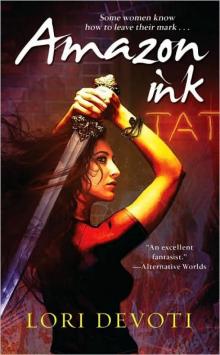 Amazon Ink
Amazon Ink One Soul To Share
One Soul To Share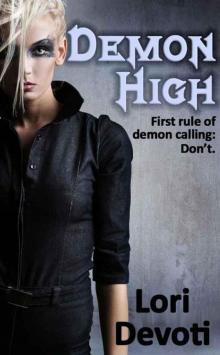 Demon High
Demon High Vampire Bites: A Vampire Romance Anthology
Vampire Bites: A Vampire Romance Anthology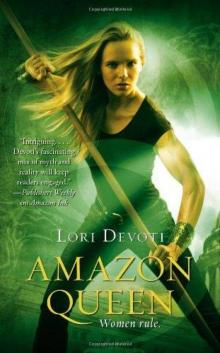 Amazon Queen
Amazon Queen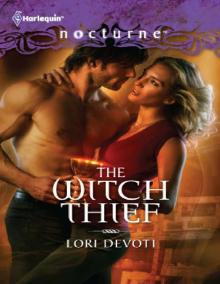 The Witch Thief (Harlequin Nocturne)
The Witch Thief (Harlequin Nocturne)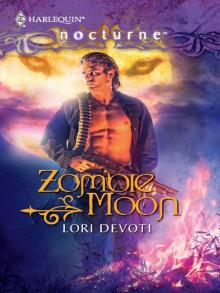 Zombie Moon
Zombie Moon